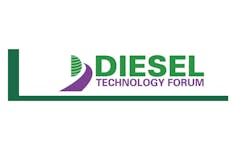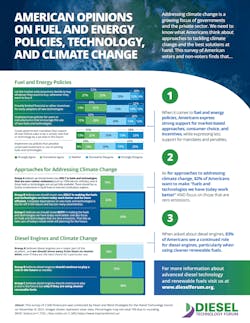Most Americans favor investing in current engine tech, Diesel Tech Forum survey finds
A survey commissioned by the Diesel Technology Forum (DTF) found that a large majority of Americans sampled don't want to reinvent the wheel when it comes to climate change.
According to the survey, which polled 2,500 Americans in November 2022 , 82% preferred improving current fuels and technologies that are already in place while also focusing on zero-emissions solutions. Additionally 83% of the survey’s respondents indicated that they see diesel engines continuing to play a role in the future, especially with renewable fuels.
“It’s clear that Americans favor more of a carrot than a stick approach to setting policy and encouraging new fuels and technologies,” DTF Executive Director Allen Schaeffer said. “We would be wise to apply these insights, knowing that the time and path for energy transitions is likely longer and more convoluted than anyone can predict.”
Overall, the short, three-question survey revealed that most of the population polled preferred market-based approaches and consumer choice in regards to fuel and energy policies. This can include emissions-trading efforts, which encourage flexibility and financial incentives for cutting emissions, according to the United Nations.
The survey found that there was less general support for financial incentives and tax policies focused largely on new technologies, and the highest disapproval ratings among those polled were for punitive financial policies or mandates against the continued use of existing technologies.
“Addressing climate change is a growing focus of governments and the private sector alike,” DTF Executive Director Allen Schaeffer said. “It is important to understand where the American people stand on key issues now being considered in policy approaches to reducing greenhouse gas emissions including mandates, tax policy, incentives, and technology choices.”
About one in five, or 19% of respondents, believed that there should be no further investment in fossil fuels or internal combustion engines. At least this shows four out of five respondents are still reasonable, as modern engine technology has made great strides in limiting emissions.
Pairing diesel internal combustion engines with aftertreatment systems, and technology such as selective catalytic reduction, NOx emissions can be reduced by 90% and particulate matter by up to 50%. Engine manufacturers have also invested in developing internal combustion engines that use alternative fuels, including propane, natural gas , and hydrogen, resulting in near-zero emissions.
There are also duty cycles in which electrification or fuel cells aren't mature enough to handle, don't have the necessary charging/fueling infrastructure, or don't make economic sense. While electric garbage trucks can leverage regenerative braking and can charge at night, it's far more practical for a Canadian logging truck to run off diesel for the foreseeable future.This may change someday, as Scania has developed an 80-tonne battery-electric timber hauler in Sweden, but there are usually exceptions to every rule.
This is why the DTF decided to do the survey: to find out what people in the U.S. really feel are the best approaches to address climate change, in a venue outside of partisan rhetoric.
"The debate is often framed in absolutes and extremes, all or none, electric vs. internal combustion, and which is the best and right approach," Schaeffer said. "The American people have a more practical perspective that values a wide range of solutions and consumer choice. Americans want an inclusive approach, an all-of-the-above strategy, and aren’t comfortable with us only investing in zero carbon emissions technologies."
About the Author

John Hitch
Editor-in-chief, Fleet Maintenance
John Hitch is the award-winning editor-in-chief of Fleet Maintenance, where his mission is to provide maintenance leaders and technicians with the the latest information on tools, strategies, and best practices to keep their fleets' commercial vehicles moving.
He is based out of Cleveland, Ohio, and has worked in the B2B journalism space for more than a decade. Hitch was previously senior editor for FleetOwner and before that was technology editor for IndustryWeek and and managing editor of New Equipment Digest.
Hitch graduated from Kent State University and was editor of the student magazine The Burr in 2009.
The former sonar technician served honorably aboard the fast-attack submarine USS Oklahoma City (SSN-723), where he participated in counter-drug ops, an under-ice expedition, and other missions he's not allowed to talk about for several more decades.

